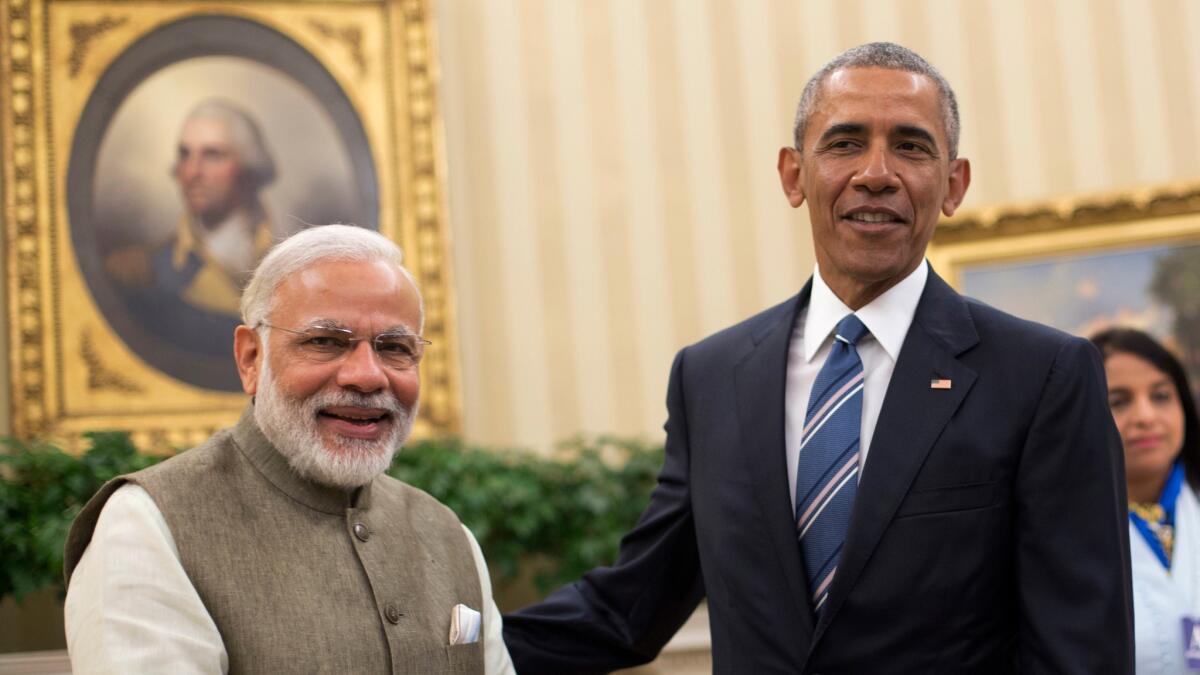Obama pushes Indian prime minister on climate change

- Share via
Reporting from Washington — President Obama and Indian Prime Minister Narendra Modi took steps Tuesday toward a tougher alliance against climate change, though at a more tentative pace than White House aides might like as Obama seeks to secure a key legacy item before he leaves office.
During a working lunch at the White House, Modi pledged to support last year’s Paris agreement to limit greenhouse gases, a significant step toward bringing the historic deal into full force.
But differences were clear in a joint statement issued after the session. The U.S. side reaffirmed its commitment to joining “as soon as possible this year,” while India “has begun its processes to work toward this shared objective.”
Modi, who once was barred from entering the United States because of his alleged support for Hindu extremists, will address a joint meeting of Congress on Wednesday.
It was the third summit between the current leaders of the world’s two largest democracies, and discussions focused on areas of joint concern, from solar power and counter-terrorism to wildlife conservation and communicable diseases.
U.S. and Indian officials agreed, for example, to start engineering and site-design work to build six Westinghouse nuclear power plants in India, a project intended to help the fast-growing country meet its energy needs while reducing reliance on fossil fuels.
There’s an understanding on the Indian side that this is important for President Obama
— Tanvi Madan
White House advisors and some environmental activists praised the apparent progress on climate change.
The Paris agreement enters into force when 55 countries, representing 55% of global emissions, actually join, as the White House sees it. India’s participation would reach that approximate threshold.
Obama and Modi are “on the same page” about bringing the Paris climate agreement into force, said Brian Deese, a climate specialist and senior advisor to Obama. “That’s significant because it comes in the context of a growing number of countries that have made similar commitments.”
India’s support “should reinforce momentum that we can put the Paris agreement into force far earlier than anyone anticipated,” he added.
With seven months until he leaves office, Obama is eager to move quickly, especially in politically sensitive areas – like climate change – where a Republican successor might ignore the work he has started.
The White House doesn’t consider the Paris agreement a binding treaty and isn’t submitting it to the GOP-led Senate for ratification. Still, Indian officials want to know that Obama will live up to his promises and get the deal implemented.
“There’s an understanding on the Indian side that this is important for President Obama,” said Tanvi Madan, director of the India Project at the nonpartisan Brookings Institution in Washington.
“Their time frame is different,” she said of Modi’s side.
Modi brought his own to-do list, and achieved at least some of his goals.
He wanted the Obama administration to push China to allow India, a regional rival, to join the Nuclear Suppliers Group, a multinational organization that seeks to stop nuclear proliferation by controlling export and transfer of nuclear materials.
See the most-read stories this hour »
Obama said Tuesday that the U.S. will support India’s application when it comes up for review this month.
The administration also recognized India as a “major defense partner,” a designation that allows greater transfers of military technology, more joint exercises and other military cooperation.
The two sides agreed to work more closely on cybersecurity. The U.S. pledged to support broadband expansion in India, and to help promote development of India’s digital economy.
The advances on climate change looked like baby steps to some analysts, especially since the two sides failed to report a final deal for construction of nuclear reactors. The Westinghouse project has dragged on for a decade.
A third of people in India still have no access to electricity, said Katie Tubb, an energy specialist at the Heritage Foundation, a conservative think tank in Washington.
“The way you raise opportunity for people is affordable and reliable energy,” Tubb said. “Nothing against solar, but solar is not the solution to a shortage of affordable, reliable energy.”
In her view, the meeting yielded “more political statements” than substance.
ALSO
22 of the world’s most polluted cities are in India
What it’s like to live in the world’s fastest growing major economy
Even in fast-changing India, kushti wrestling is a wellspring of power, pride and identity
More to Read
Sign up for Essential California
The most important California stories and recommendations in your inbox every morning.
You may occasionally receive promotional content from the Los Angeles Times.











